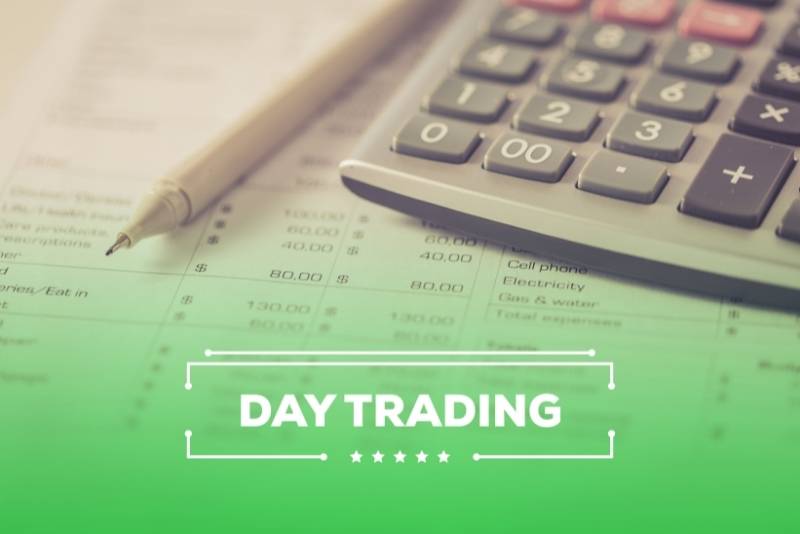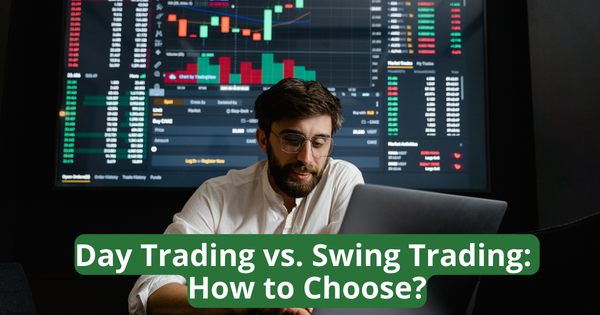Day trading and swing trading are among the popular trading types, yet how different are they? This article walks you through the main aspects that showcase the benefits and drawbacks of swing trading and day trading. As a result, you can choose a suitable trading type for your investments and risk tolerance. At the end of this article, you might be able to decide on which trading method is more suitable, day trading vs. swing trading
What is Day Trading?

Day trading indicates the purchases and sales of the security in a single trading day. It is common in almost all marketplaces, yet forex and stock traders seem to love day trading the most.
The key weapons that day traders use include high amounts of leverage and short-term trading strategies. So, they can earn profits over small price movements of highly-liquid stocks or currencies.
Benefits of Day Trading
There must be reasons why stock and forex traders favor day trading. The main points below can generate clarity about this topic in the discussion table.
- Quick returns on your investment
When day trading, you do not have to wait for months or years to see whether your investments are profitable. You will find the outcome at the end of a trading day. If you apply effective strategies at the right time, high profits will not come as surprises.
- Basic requirements
Every starting point needs good preparation. And day trading is no exception. You should learn the basics to use your initial investments cleverly. Yet, you do not need to graduate from any financial universities or equip complex knowledge to day trade. It leaves the door open for those who are eager to learn and able to adapt well to the tumultuous market conditions.
- Flexible, in terms of time and workplace
Being a day trader is synonymous with taking it as an official full-time job. Yet, you do not have to show up at the office on time or deal with any boss’s complaints. You take control of your trading, so you have a proactive role in time management and the workplace.
Risks of Day Trading
Having a look at another side of the same topic is crucial to have a big picture. Day trading does not include all good things. It also comes along with some drawbacks that you should know.
- Potential enormous losses in the beginning
Short cycles of day trading mean you have limited time to handle the tumultuous price actions. There are possibilities of profits and losses! According to the U.S. Securities and Exchange Commission, beginner day traders should be mentally ready for potential losses in their early days of trading.
- Substantial Budgets
Not only being mentally ready, but you should also be financially ready for potential losses. It requires a great deal of money for your day trading investments. What a challenge for those who have a tight budget!
- Full Commitment
As mentioned above, being a day trader means a full-time job. It indicates that you should dedicate your time and effort to monitoring your trades and developing strategies. Also, the volatility of market conditions needs your intense focus to conduct trades to earn from small price movements. So, if you are not willing to quit your full-time job to day trade, it sounds like it is not your career yet.
What is Swing Trading?

Swing trading relates to trades lasting from a few days to several months. Technically, it shares some common characteristics with day trading, yet the longer time frame is the primary difference.
Technical analysis and fundamental analysis are what swing traders use to develop viable strategies. They need insights into the patterns of price actions to handle sudden reversals or even pinpoint the next market moves.
Advantages of Swing Trading
- Less time required
There is less strict time commitment when you swing trade. You do not have to be glued to the monitoring screen the whole time as you have more time in-between to close a swing trade. It allows you to sit down on trades when having another full-time job.
- Proactive role in controlling your losses
You can set the maximal losses you can take for a swing trade. It helps you become the master of your own trade as you know your potential losses beforehand.
- Not necessarily be a rich to swing trade
Unlike day traders who need to have a strong-enough backup of finance, swing traders have less upfront budget to kick off. There are many fundamental tools that cost almost zero for swing traders to utilize in their own favor.
Disadvantages of Swing Trading
- Longer period for trading returns
While day traders can gain their profits within a single trading day, swing traders need to wait for months. If their investments are not idle, swing trading can ‘imprison’ your money at times they might need it.
- Accumulated losses
Due to the longer time for a swing trade, you have to deal with the higher risks of accumulated potential losses. It can stress you out as the losses can be huge!
- Be ready for possibly illiquid periods
We all expect profitable trades, yet the volatile market might generate potential losses. So, you also need to have a strong backup plan of finance when suffering from illiquid periods of your swing trades.
What is the Difference Between Day Trading vs. Swing Trading?

| Day Trading | Swing Trading | |
| Frequency | Several trades per day | Several trades per week |
| Number of Transactions | More Transactions | Fewer Transactions |
| Time Horizons | Short holding time | Medium holding time |
| Time Required | More | Less |
| How You Trade | State-of-the-art trading software | Using a brokerage account |
How Often Do You Swing Trade and Day Trade?
Day traders usually complete all their trades within a trading day while it can take swing traders days, weeks, or even months. There are multiple swing trades per week while that same amount of trades can take place per day in day trading.
How Many Transactions Do You Execute?
The 1% risk rule is common sense for day traders. This principle indicates the risk you can take should not pass 1% of your portfolio on any single trade. It can help day traders navigate their trades in such crazy market turbulences. There are multiple trades per day for day traders who look for rapid compounding of returns.
Meanwhile, swing trades can last days, weeks, and even months. There can be fewer trades executed per day when you swing trade, in comparison with day trading. As a result, swing trading accumulates losses or profits more slowly due to its longer holding period.
How Long Does A Day Trade/Swing Trade Last?
Although both swing and day trading are fast-paced forms, there is a key point to differentiate them. The ultimate goal of swing trading is to capture short-to-medium profits. On the other hand, day trading aims to earn profits over within-a-trading-day trades.
How Much Active Time Do You Need to Day Trade or Swing Trade?
On average, swing trading takes about 45 minutes per night or less while day trading can eat up at least three to four hours per day. In fact, day traders can get busy all the time as they have to complete all trades within a single trading day.
It is among the most crucial factors to choose a suitable trading type. If you love to take trading as passive income, swing trading is an ideal choice. If you are willing and ready to take trading as an instant source of income, day trading should be your consideration.
How You Trade
Swing traders can create positions and trade through online brokerage accounts. They do not have to react within seconds of price movements thanks to longer time horizons.
Meanwhile, it is essential for day traders to have the latest software and technology. The main purpose is to earn high profits from small price changes, so timely reactions are the key. So, modern trading tools are what day traders need to conduct effective analysis in a shorter period of time.
FAQs
What Does a Day Trader Do?
A day trader manages their trades in such a fast-paced, exciting, and thrilling environment. So, they can enrich their accounts through short-term price movements. They usually exit their positions by the end of the trading day, implement a high volume of trade, and make an effort to earn profits through small trades.
What Does a Swing Trader Do?
The skeleton of swing trading strategies is what traders get from technical analysis. They will see the pattern of price movements so it is possible to have careful preparation for sudden changes. Moreover, they can pinpoint the next market movements thanks to insights into price actions.
It is common for swing traders to hold positions for several days. The purpose is to wait for larger price movements to earn higher profits with fewer trades.
How Do I Start Day Trading?
There are many trading platforms, charting software, computer setups, etc. for day traders to kick off their career. Besides, subscriptions and live pricing tools are what they can use to support their trade setups, implementation, and management.
Day Trading vs. Swing Trading: Which is More Profitable?
In general, day trading can help you gain higher profit potential than swing trading. Yet, the reality of trading is full of all possibilities. The determining factor is the way traders apply their strategies and tactics. Their understanding of the market moves and the patterns is a powerful trading edge.
Is Day Trading Riskier Than Swing Trading?
Both day trading and swing trading include inherent risks. Yet, day trading might contain less risk than swing trading thanks to shorter holding periods. The longer the holding is, the higher losses can be accumulated.
What’s Better, Day Trading vs. Swing Trading?
Well, the answer is up to you. There are two main factors that you should consider, including budget and time commitment. If you are willing to spend your time and have a strong financial backup, day trading can be ideal. Otherwise, swing trading might be a better option.
Day Trading vs. Swing Trading: Which Will You Choose?
Day trading and swing trading are two fast-paced trading types that many people still get confused about. This article walks you through the main points for differentiation. Also, you can learn the benefits and drawbacks of each trading type. As a result, you can easily choose a suitable trading approach to enrich your trading account.


